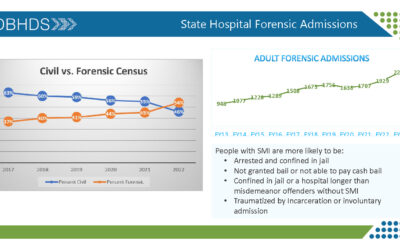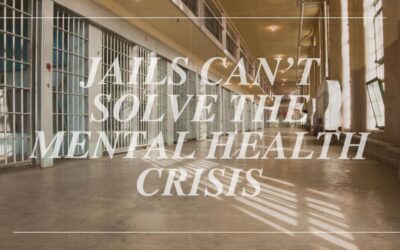Await Governor’s Decision
Several mental health bills and budget items we support passed the legislature and now await Governor Youngkin’s signature, amendment or veto. Overall it was a successful session for mental health, although a few bills may be vetoed. A few items of interest:
Workforce – “Barrier Crimes” – A long time coming, HB 1269 (Price) and SB 626 (Pillion) produced a compromise that removes some of the criminal history barriers to employment for Peer Recovery Specialists. Although limited to misdemeanors, they are a significant start to employment in mental health and substance use treatment programs where peers make a huge positive difference. Passed the House 93-3 and Senate 34-6.
Decriminalizing Suicide – After several years of trying, HB 81 (Simon) abolishes the common law crime of suicide, which is not in the criminal code, but has moral and practical impacts for family members, including possible financial implications for the survivors of military service members. Questions from the insurance industry resulted in a delayed enactment clause to give another year for the Bureau of Insurance to study. Passed the House 61-39, and Senate 21-19. [For more information, see our blog [ https://mhav.org/suicide-is-a-crime-in-virginia-since-when/ ]
Training on the “Red Flag Law” – Substantial Risk Orders. HB 637 (Sullivan) requires the state to establish a training program for law-enforcement and others on the proper use of substantial risk orders – court orders to remove firearms from someone determined to be a threat to themselves or others. The original law passed a few years ago and can prevent suicides, but implementation is spotty, with a reluctance to apply it due to a lack of training. Passed on party line votes in both houses.
Strengthening Community Care – Crisis Stabilization Centers – HB 1336 (Sickles) and SB 568 (Deeds) allow these vital community based crisis care facilities to use certain medications in treating patients in mental health emergencies. This enables more people to get appropriate crisis care in their own community and without long waits for a state hospital. Passed both houses unanimously and signed by the Governor.
Incentives for referral to mental health care – As introduced, SB 87 (Favola) would have requiredhealth insurance provider panels, when contracting with primary care providers, to provide incentives for appropriate referral to mental health services. Amended to be optional, it passed unanimously.
Mental health treatment for health care professionals – HB 42 (Hope) adds dentists and dental hygienists to health care professionals in the review process for career fatigue and wellness. Most importantly, it removes the requirement that voluntary admission for mental health or substance use treatment automatically must be reported to a health regulatory board if the health professional no longer is believed to be a danger to himself, the public, or their patients. Passed unanimously.
Family member presence during commitment evaluations – SB 546 (Bagby) and HB 1242 (Willett) allow a supportive family member to be present during the mental health emergency custody or detention evaluation of someone, “… unless the individual objects or the evaluator or treating physician determines that the presence of any such person would create a medical, clinical, or safety risk to the patient or health care provider or interferes with patient care.” Passed unanimously.
[Note: A truly bipartisan bill, Governor Youngkin and Democrats Bagby and Willett sponsored this effort on behalf of Irvo Otieno’s mother. She was denied access to support and calm her son and his behavior escalated, beginning a downward spiral and his death by suffocation a few days later, with murder charges against the deputies who restrained him.]
Investigating abuse at state hospitals – SB 178 (Favola) and HB 313 (Hope) direct the Office of the State Inspector General to develop a plan to fulfill its statutory obligation to fully investigate all complaints it receives alleging abuse, neglect, or inadequate care at a state psychiatric hospital, to submit the plan to legislative committees, and provide annual reports on the number of allegations, investigations, etc. Passed unanimously.
Felony assault against a protected person while in a mental health crisis – Senator Boysko and Delegate Watts (SB 357, HB 267) address the current practice of bringing felony charges with a mandatory 6-month jail sentence against someone with a serious mental illness or intellectual/developmental disability whose behavior, in the midst of a mental health crisis, gets them arrested for assaulting a protected person (police, corrections officer, judge, first responder), even if there is no bodily injury. The bills provide for an “affirmative defense to prosecution” – an improvement, and worthy of support. Passed both houses as amended on party line votes.
[See our Statement urging the Governor to sign https://mhav.org/amend-the-assault-on-a-protected-person-statute/, and our blog post https://mhav.org/when-a-call-for-help-gets-you-jail-time/.]
Mental health services for school students – HB 919 (Srinivasan) provides for school boards to increase the accessibility of school-based tele-therapy services for students who may not have access to mental health services otherwise. The original bill used the word “shall.” The amended version that passed the House substitutes the word “may” for “shall.” Still a positive step. Passed 88-11 and 39-1.
Instruction on mental health education – HB 603 (Price) as drafted would have added more teeth to current requirements that school boards provide for mental health education as part of the public school health curriculum. The substitute version at least adds more specific topics to what must be covered. Passed the House 59 to 41 and the Senate 23-17.
What’s next? Act fast to urge the Governor to sign bills you care about. You can see where a bill is in the process by clicking the bill number links above. https://www.governor.virginia.gov/communicating-with-the-governors-office/



